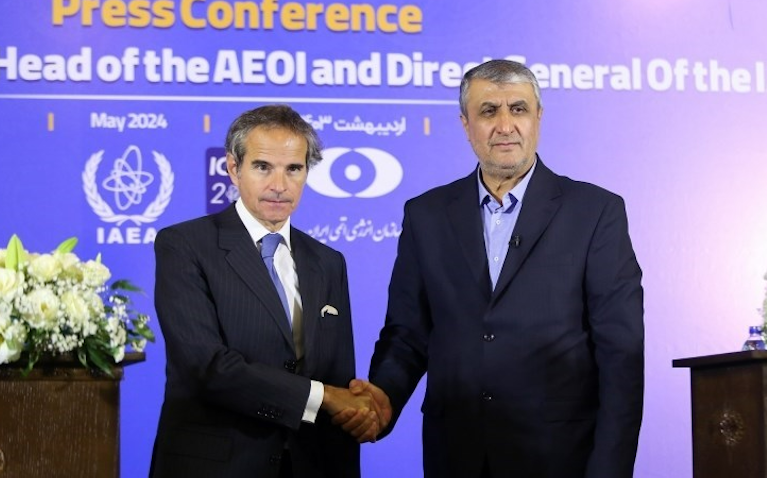The head of the International Atomic Energy Agency, Rafael Grossi, has returned from a trip to Iran with a caution to Tehran: stop “loose talk” about the possibility of purusing a nuclear weapons program.
In an interview with The Guardian, Grossi said:
Loose talk about nuclear weapons is extremely serious for me. And I think it should stop. We are moving closer to a situation where there is a big, huge question mark about what they are doing and why they are doing it.
In the past week, there have been a series of statements from Tehran indicating that the Iran regime’s might set aside its long-standing pledge that it will not pursue an atomic bomb.
On April 18, the head of the Revolutionary Guards unit overseeing the security of nuclear facilities, said Iran can “reconsider its nuclear doctrine” if Israel attacked nuclear sites.
Four days later, hardline MP Javad Karimi Qoddousi claimed there was only “a one-week gap from the issuance of the order to the first test” of a warhead.
Qoddousi’s remarks sparked pushback across the Iranian political spectrum, with accusations of “acting against national security” and sidelining the fundamental issues of the Israeli war on Gaza. Foreign Ministry spokesman Nasser Kanani on April categorically rejected that Iran was seeking nuclear weapons.
But last week Kamal Kharazi, the Supreme Leader’s foreign policy advisor and a former Foreign Minister, repeated the warning: “We have no decision to build a nuclear bomb but should Iran’s existence be threatened, there will be no choice but to change our military doctrine.”
Grossi said the status of IAEA inspections of Iran’s sites, to ensure that it is pursuing only a civil nuclear program, is “in a very tight spot”.
Iran began restriction of inspections in early 2021, limiting the monitoring of sites and withholding all video from surveillance cameras. A new agreement in March 2023 restored some, but not all, of the scope of inspections.
Grossi said he is trying to negotiate detailed understandings but not another agreement. Meanwhile, some IAEA member states are preparing a censure motion for June’s meeting of the Board of Governors.
Grossi, who visited Tehran and Isfahan last week, said to the Financial Times on his return that Iran showed a willingness to engage in “serious dialogue” over “concrete” issues.
But he was far more cautious in the Guardian:
I try to make the most of what I can with the cards I have and have a process which is useful. And I think it is not only useful, it is indispensable unless you want to go to war or something like this….
I have been saying that without meaningful engagement, without us being able to have capacity to see and to see more in Iran, my ability to guarantee that everything is for peaceful uses in Iran would be limited and perhaps approaching the moment where I would not be able to say that any more.’
There would be a moment when I would draw a line. It would be a very critical juncture because the international community would have to grapple with the reality that we don’t know what Iran may or may not have and the countries will draw their conclusions.


As much of the world’s media turns to reports about the crashing/emergency landing of a helicopter carrying the Iranian president, Masih Alinejad posts: https://x.com/AlinejadMasih/status/1792255796018893283
“I think this is the only crash in history where everyone is worried if someone survived: Happy World Helicopter Day!”
Rial strengthens. It fell to 660,000 to the USD last month but is now under 600,000: https://www.bonbast.com/
160 Lawyers Write to US Leaders Alleging Iran Bribed South Africa
https://iranwire.com/en/news/129348-160-lawyers-write-to-us-leaders-alleging-iran-bribed-south-africa/